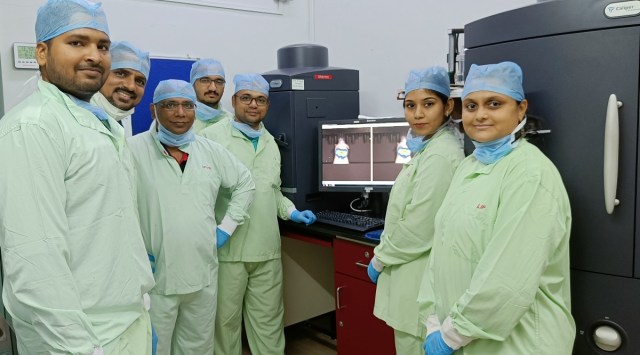- India
- International
New study recommends next-generation sequencing for extending lung cancer treatment to more patients
The higher sensitivity of the NGS platform could detect 25 per cent more patients who may be false negative based on the routine methodology.
 The study published recently in the journal Translational Oncology has recommended using NSG over conventional technologies. (Express Photo)
The study published recently in the journal Translational Oncology has recommended using NSG over conventional technologies. (Express Photo)A new study has underlined that a significant proportion of lung cancer patients can remain deprived of treatment with (medication used to treat non-small cell lung carcinomas with specific mutations) if next-generation sequencing (NSG) is not performed on the relapse of the disease. The study published recently in the journal Translational Oncology has recommended using NSG over conventional technologies.
“This would help identify a set of lung cancer patients (25 per cent) who relapse on the first-generation drug (Erlotinib) but also remain negative for a secondary T790M mutation based on conventional technologies,” Amit Dutt, scientist and principal investigator of the study at Tata Memorial Centre-Advanced Centre for Treatment, Research and Education in Cancer (TMC-ACTREC), told The Indian Express.
Lung cancer is the most common cancer among men (11 per cent) and the leading cause of cancer death across the globe (20 per cent). More people die of lung cancer each year than colon, breast, and prostate cancers combined.
The epidermal growth factor receptor (EGFR) gene is one of the most frequently mutated genes in lung cancer. EGFR mutations were discovered in 2004, and it was reported that EGFR inhibitors shrink tumours of lung cancer carrying these mutations, according to the study authors.
Dr Dutt said that they had earlier shown that EGFR mutations occur in 23-25 per cent of lung cancer patients of Indian origin, which is twice the incidence observed among Caucasian patients. “These EGFR mutations tend to occur more commonly among non-smoker women patients, across the globe. Since the approval of EGFR inhibitors to treat EGFR mutation-positive lung cancer patients, the median survival of stage IV lung cancer patients has increased from around seven to above 40 months, and beyond,” he said.

Patients treated with Erlotinib, a first-generation EGFR inhibitor, eventually develop resistance to the drug. Around 50 per cent of patients develop a secondary T790M mutation in the EGFR gene. The T790M mutation-positive tumours, though, retain sensitivity to a third-generation EGFR inhibitor, Osimertinib. However conventional technologies used in clinics – such as Sanger sequencing or real-time PCR, due to their low resolution, fail to detect the mutation when the number of mutant EGFR molecules occur at lower than 5 per cent of all EGFR molecules in a tumour cell.
In this study, Asim Joshi and Dr Ashwin Butle, from the Dutt laboratory at ACTREC-TMC, in collaboration with Dr Kumar Prabhash and Dr Vanita Noronha from Tata Memorial Hospital-TMC, sampled 16 patients who were EGFR mutation-positive at initial diagnosis, but were negative for the T790M mutation, following the relapse of cancer, using routine clinical diagnostics. These samples were resequenced using an advanced NGS technology to interrogate for mutations likely to have been missed using conventional technology.
“Interestingly, four of 16 patients with relapsed tumours were found to be positive for EGFR (T790M) mutation that was earlier diagnosed as negative in clinics,” Dr Dutt said adding that the higher sensitivity of the NGS platform could detect 25 per cent more patients who may be false negative based on the routine methodology.
To understand the physiological relevance of EGFR (T790M) mutation occurring at low frequency in a lung tumour, the group developed an erlotinib-resistant lung cancer cell line in the laboratory by treating the lung cancer cells with a low dose of erlotinib for a prolonged period of one year. They also found that the presence of T790M mutation occurring at such low frequency was found to be adequate to make the cells resistant to erlotinib.
These cells were genetically tagged and implanted in the lung muscles in mice to develop an intricate orthotopic lung cancer mouse model for the first time in the country to monitor disease progression and perform small animal PET-scan imaging at the inhouse facility at ACTREC-TMC.
Newsletter | Click to get the day’s best explainers in your inbox
These researchers from the Dutt Laboratory, in a separate study, also showed that a low-dose once a week, Osimertinib treatment, as opposed to daily dosing (that costs above Rs 2 lakh per month), is a possible treatment option in delaying the onset of the disease in post-surgical resection of early-stage tumours.
The low-dose, once-a-week osimertinib has several advantages over daily dosing, including lower toxicity, affordability, ease of administration and delaying or preventing acquired resistance that remains to be explored, Dr Dutt said.
“These are remarkable practice-changing findings that could not only reduce the cost of treatment by one-seventh but also help extend the benefit of the treatment to 25 per cent more lung cancer patients who develop resistance to first-generation EGFR inhibitors. A clinical trial to validate the findings from this study in EGFR mutation-positive lung cancer patients is currently under development at the Tata Memorial Hospital,” Dr Kumar Prabhash added.
Click here to join Express Pune WhatsApp channel and get a curated list of our stories
Apr 26: Latest News
- 01
- 02
- 03
- 04
- 05







































